Strategic Planning for Holiday Inn: Performance Metrics & Factors
VerifiedAdded on 2023/01/06
|11
|3449
|1
Report
AI Summary
This report provides a detailed analysis of strategic planning within the hospitality industry, focusing on Holiday Inn as a case study. It explores various factors crucial for implementing chosen strategies, including mergers and acquisitions, joint ventures, management contracts, and franchising. The report critically analyzes Holiday Inn's franchising model, emphasizing the importance of customer service, advertising, cost control, and product differentiation. It also discusses creative business strategies such as making guests part of the brand culture, creating valuable hotel experiences, and highlighting the strength of the hotel destination. Furthermore, the report outlines different performance metrics, including key performance indicators (KPIs) related to accommodation, food and beverage, and other hotel services, to measure the effectiveness of strategic planning initiatives. The analysis aims to provide insights into how Holiday Inn can optimize its strategic planning process for long-term growth and operational efficiency. Desklib provides access to this and other solved assignments for students.
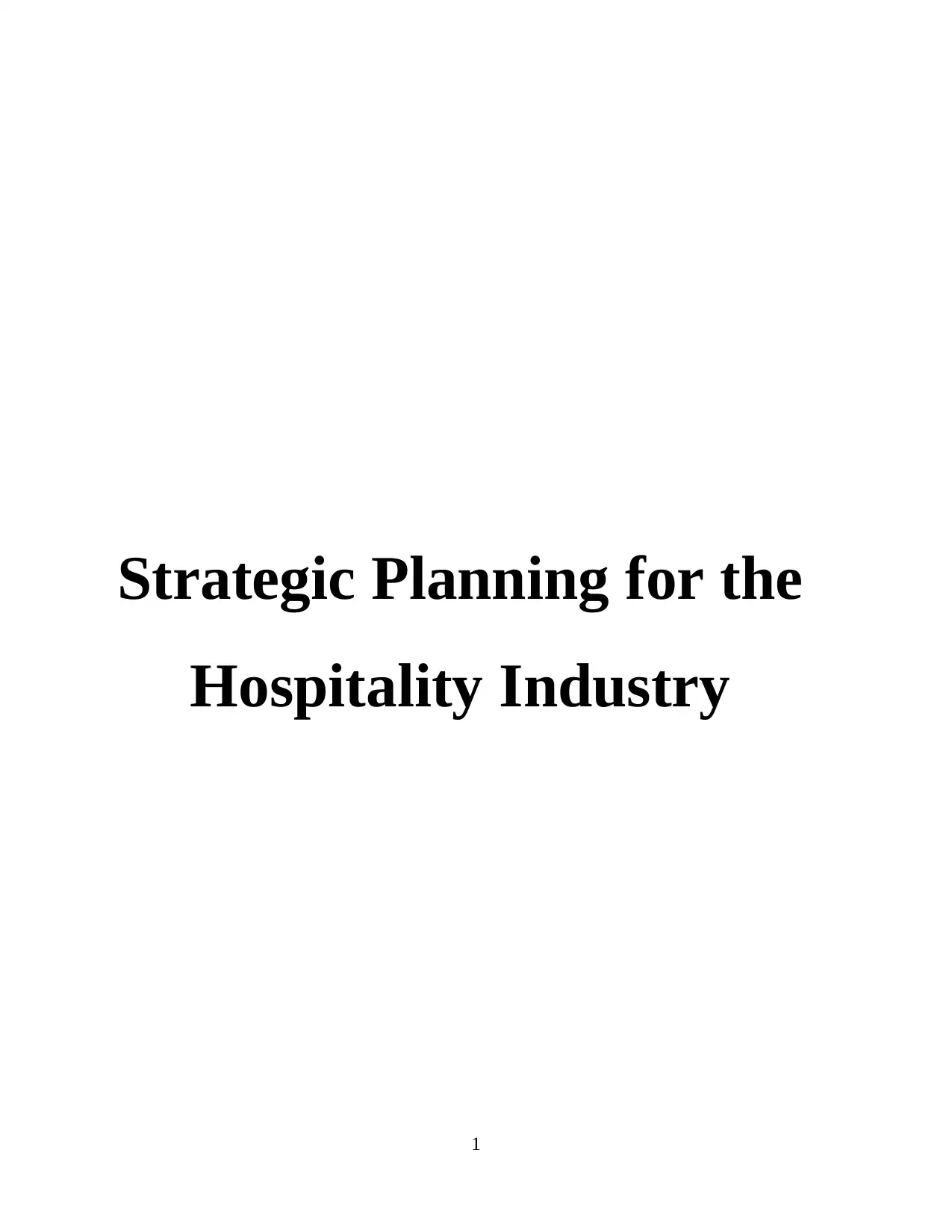
Strategic Planning for the
Hospitality Industry
1
Hospitality Industry
1
Paraphrase This Document
Need a fresh take? Get an instant paraphrase of this document with our AI Paraphraser
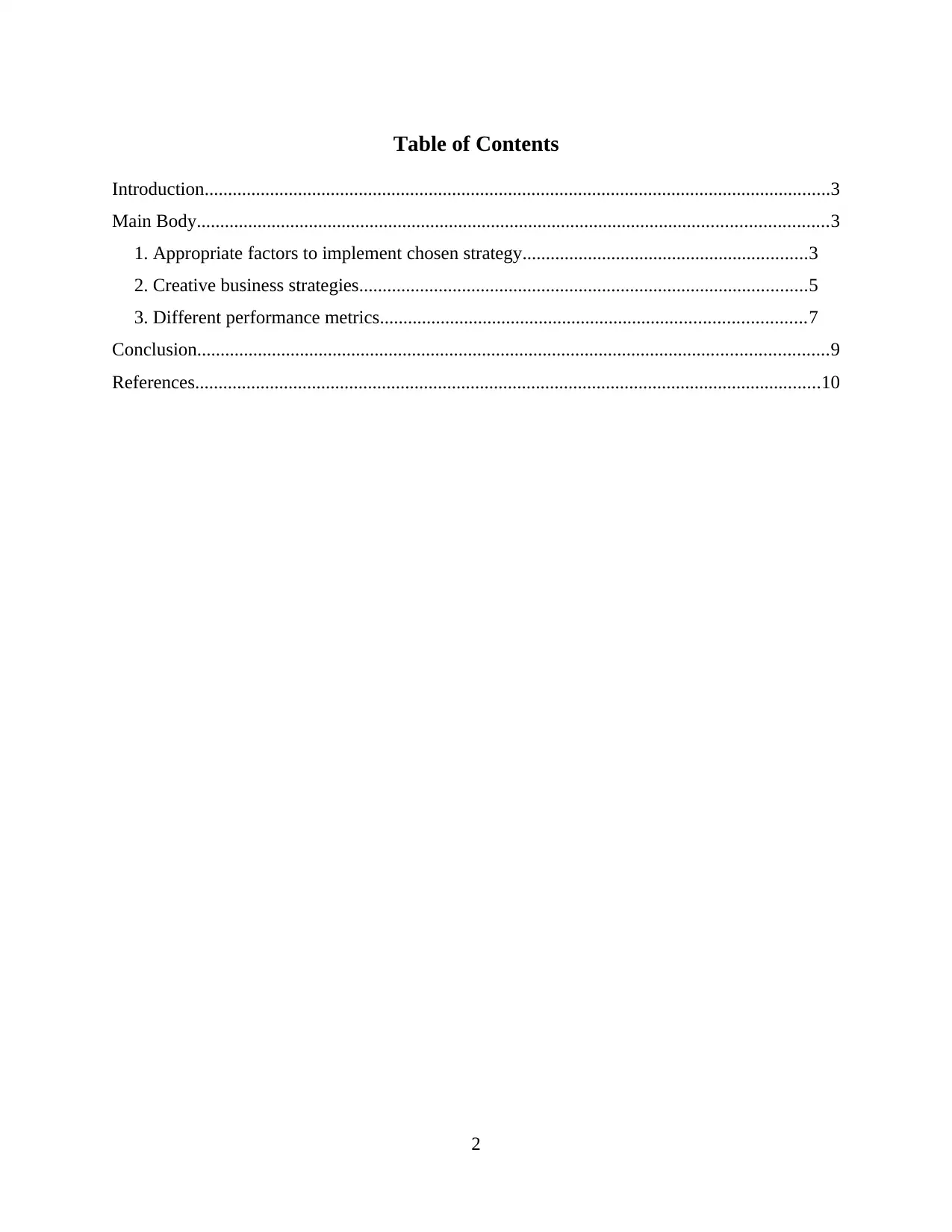
Table of Contents
Introduction......................................................................................................................................3
Main Body.......................................................................................................................................3
1. Appropriate factors to implement chosen strategy.............................................................3
2. Creative business strategies................................................................................................5
3. Different performance metrics...........................................................................................7
Conclusion.......................................................................................................................................9
References......................................................................................................................................10
2
Introduction......................................................................................................................................3
Main Body.......................................................................................................................................3
1. Appropriate factors to implement chosen strategy.............................................................3
2. Creative business strategies................................................................................................5
3. Different performance metrics...........................................................................................7
Conclusion.......................................................................................................................................9
References......................................................................................................................................10
2
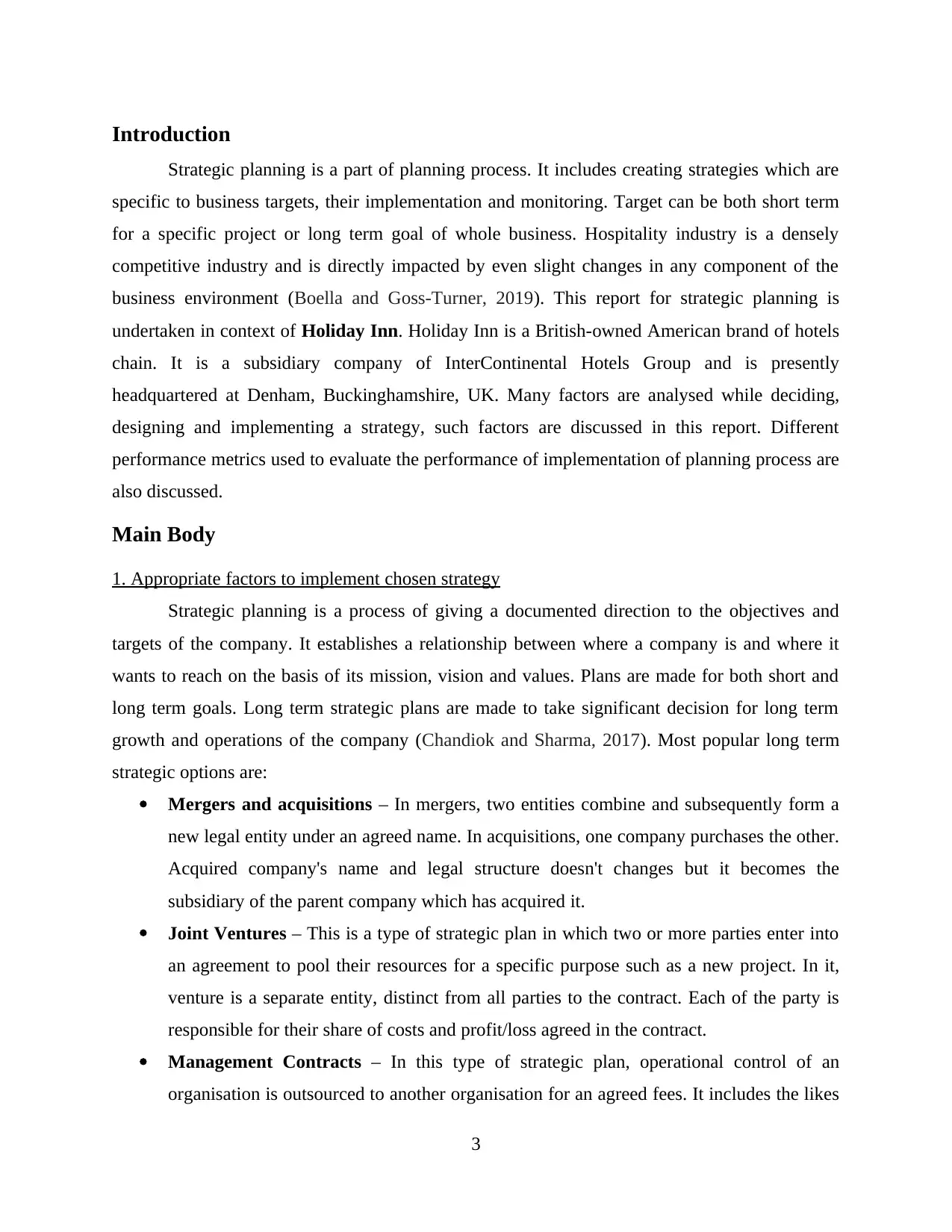
Introduction
Strategic planning is a part of planning process. It includes creating strategies which are
specific to business targets, their implementation and monitoring. Target can be both short term
for a specific project or long term goal of whole business. Hospitality industry is a densely
competitive industry and is directly impacted by even slight changes in any component of the
business environment (Boella and Goss-Turner, 2019). This report for strategic planning is
undertaken in context of Holiday Inn. Holiday Inn is a British-owned American brand of hotels
chain. It is a subsidiary company of InterContinental Hotels Group and is presently
headquartered at Denham, Buckinghamshire, UK. Many factors are analysed while deciding,
designing and implementing a strategy, such factors are discussed in this report. Different
performance metrics used to evaluate the performance of implementation of planning process are
also discussed.
Main Body
1. Appropriate factors to implement chosen strategy
Strategic planning is a process of giving a documented direction to the objectives and
targets of the company. It establishes a relationship between where a company is and where it
wants to reach on the basis of its mission, vision and values. Plans are made for both short and
long term goals. Long term strategic plans are made to take significant decision for long term
growth and operations of the company (Chandiok and Sharma, 2017). Most popular long term
strategic options are:
Mergers and acquisitions – In mergers, two entities combine and subsequently form a
new legal entity under an agreed name. In acquisitions, one company purchases the other.
Acquired company's name and legal structure doesn't changes but it becomes the
subsidiary of the parent company which has acquired it.
Joint Ventures – This is a type of strategic plan in which two or more parties enter into
an agreement to pool their resources for a specific purpose such as a new project. In it,
venture is a separate entity, distinct from all parties to the contract. Each of the party is
responsible for their share of costs and profit/loss agreed in the contract.
Management Contracts – In this type of strategic plan, operational control of an
organisation is outsourced to another organisation for an agreed fees. It includes the likes
3
Strategic planning is a part of planning process. It includes creating strategies which are
specific to business targets, their implementation and monitoring. Target can be both short term
for a specific project or long term goal of whole business. Hospitality industry is a densely
competitive industry and is directly impacted by even slight changes in any component of the
business environment (Boella and Goss-Turner, 2019). This report for strategic planning is
undertaken in context of Holiday Inn. Holiday Inn is a British-owned American brand of hotels
chain. It is a subsidiary company of InterContinental Hotels Group and is presently
headquartered at Denham, Buckinghamshire, UK. Many factors are analysed while deciding,
designing and implementing a strategy, such factors are discussed in this report. Different
performance metrics used to evaluate the performance of implementation of planning process are
also discussed.
Main Body
1. Appropriate factors to implement chosen strategy
Strategic planning is a process of giving a documented direction to the objectives and
targets of the company. It establishes a relationship between where a company is and where it
wants to reach on the basis of its mission, vision and values. Plans are made for both short and
long term goals. Long term strategic plans are made to take significant decision for long term
growth and operations of the company (Chandiok and Sharma, 2017). Most popular long term
strategic options are:
Mergers and acquisitions – In mergers, two entities combine and subsequently form a
new legal entity under an agreed name. In acquisitions, one company purchases the other.
Acquired company's name and legal structure doesn't changes but it becomes the
subsidiary of the parent company which has acquired it.
Joint Ventures – This is a type of strategic plan in which two or more parties enter into
an agreement to pool their resources for a specific purpose such as a new project. In it,
venture is a separate entity, distinct from all parties to the contract. Each of the party is
responsible for their share of costs and profit/loss agreed in the contract.
Management Contracts – In this type of strategic plan, operational control of an
organisation is outsourced to another organisation for an agreed fees. It includes the likes
3
⊘ This is a preview!⊘
Do you want full access?
Subscribe today to unlock all pages.

Trusted by 1+ million students worldwide
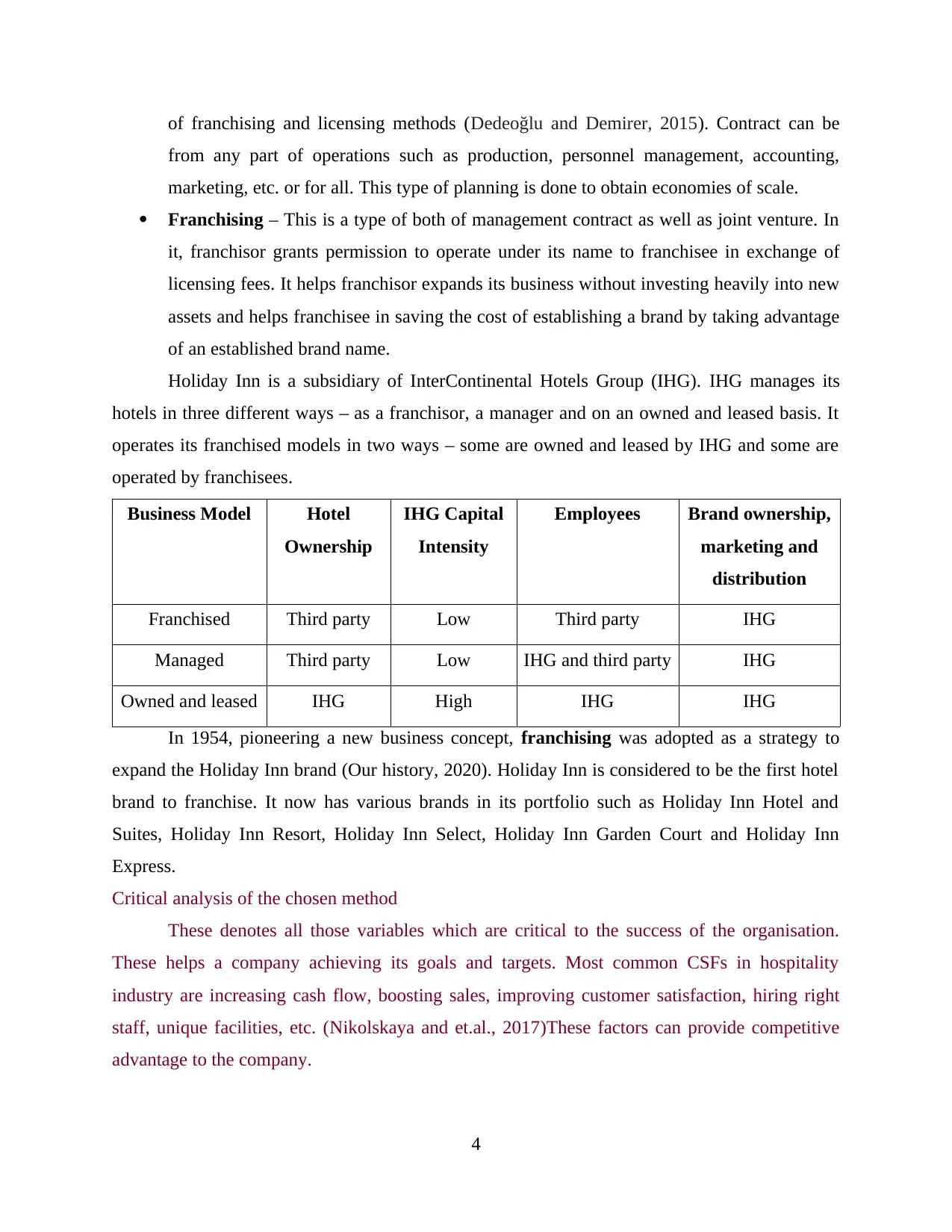
of franchising and licensing methods (Dedeoğlu and Demirer, 2015). Contract can be
from any part of operations such as production, personnel management, accounting,
marketing, etc. or for all. This type of planning is done to obtain economies of scale.
Franchising – This is a type of both of management contract as well as joint venture. In
it, franchisor grants permission to operate under its name to franchisee in exchange of
licensing fees. It helps franchisor expands its business without investing heavily into new
assets and helps franchisee in saving the cost of establishing a brand by taking advantage
of an established brand name.
Holiday Inn is a subsidiary of InterContinental Hotels Group (IHG). IHG manages its
hotels in three different ways – as a franchisor, a manager and on an owned and leased basis. It
operates its franchised models in two ways – some are owned and leased by IHG and some are
operated by franchisees.
Business Model Hotel
Ownership
IHG Capital
Intensity
Employees Brand ownership,
marketing and
distribution
Franchised Third party Low Third party IHG
Managed Third party Low IHG and third party IHG
Owned and leased IHG High IHG IHG
In 1954, pioneering a new business concept, franchising was adopted as a strategy to
expand the Holiday Inn brand (Our history, 2020). Holiday Inn is considered to be the first hotel
brand to franchise. It now has various brands in its portfolio such as Holiday Inn Hotel and
Suites, Holiday Inn Resort, Holiday Inn Select, Holiday Inn Garden Court and Holiday Inn
Express.
Critical analysis of the chosen method
These denotes all those variables which are critical to the success of the organisation.
These helps a company achieving its goals and targets. Most common CSFs in hospitality
industry are increasing cash flow, boosting sales, improving customer satisfaction, hiring right
staff, unique facilities, etc. (Nikolskaya and et.al., 2017)These factors can provide competitive
advantage to the company.
4
from any part of operations such as production, personnel management, accounting,
marketing, etc. or for all. This type of planning is done to obtain economies of scale.
Franchising – This is a type of both of management contract as well as joint venture. In
it, franchisor grants permission to operate under its name to franchisee in exchange of
licensing fees. It helps franchisor expands its business without investing heavily into new
assets and helps franchisee in saving the cost of establishing a brand by taking advantage
of an established brand name.
Holiday Inn is a subsidiary of InterContinental Hotels Group (IHG). IHG manages its
hotels in three different ways – as a franchisor, a manager and on an owned and leased basis. It
operates its franchised models in two ways – some are owned and leased by IHG and some are
operated by franchisees.
Business Model Hotel
Ownership
IHG Capital
Intensity
Employees Brand ownership,
marketing and
distribution
Franchised Third party Low Third party IHG
Managed Third party Low IHG and third party IHG
Owned and leased IHG High IHG IHG
In 1954, pioneering a new business concept, franchising was adopted as a strategy to
expand the Holiday Inn brand (Our history, 2020). Holiday Inn is considered to be the first hotel
brand to franchise. It now has various brands in its portfolio such as Holiday Inn Hotel and
Suites, Holiday Inn Resort, Holiday Inn Select, Holiday Inn Garden Court and Holiday Inn
Express.
Critical analysis of the chosen method
These denotes all those variables which are critical to the success of the organisation.
These helps a company achieving its goals and targets. Most common CSFs in hospitality
industry are increasing cash flow, boosting sales, improving customer satisfaction, hiring right
staff, unique facilities, etc. (Nikolskaya and et.al., 2017)These factors can provide competitive
advantage to the company.
4
Paraphrase This Document
Need a fresh take? Get an instant paraphrase of this document with our AI Paraphraser
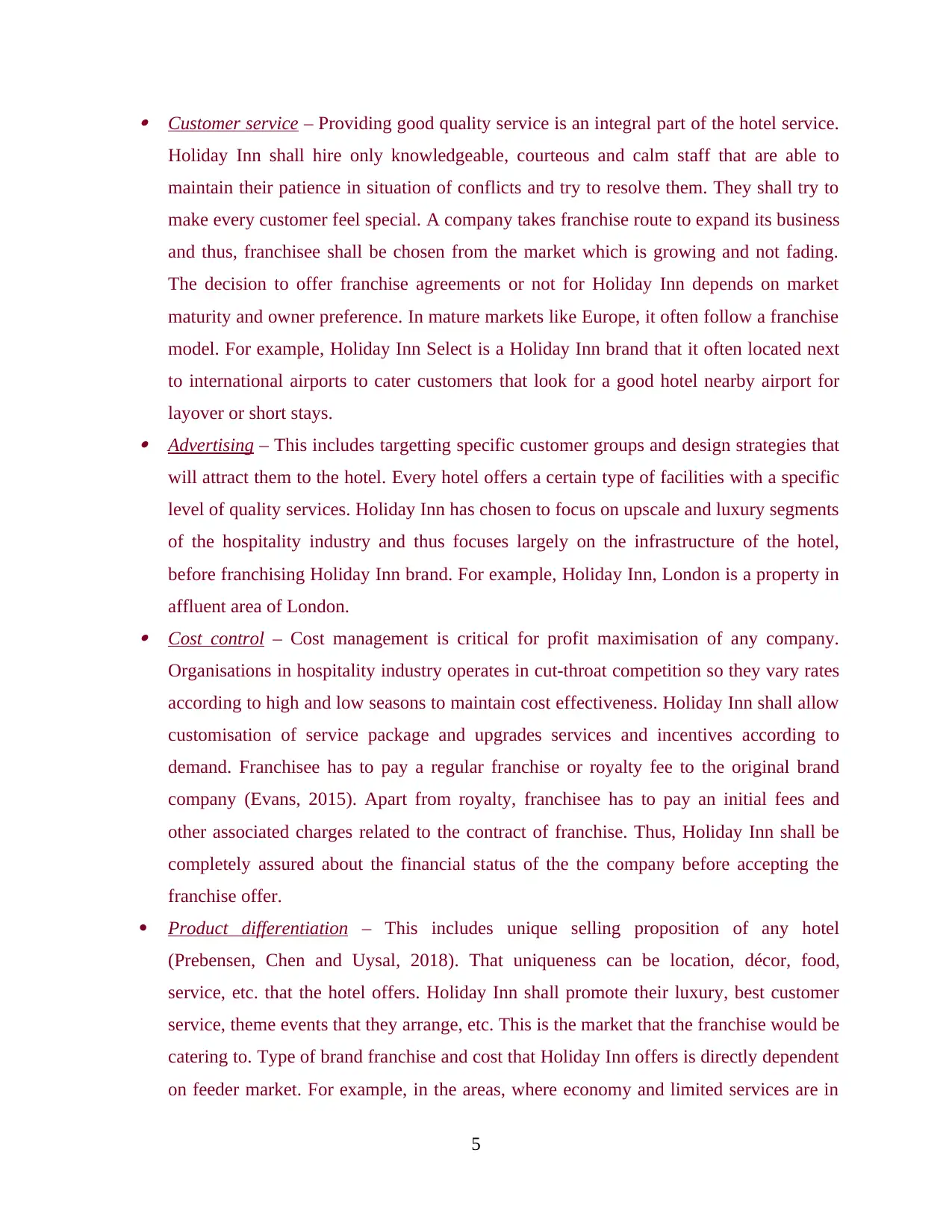
Customer service – Providing good quality service is an integral part of the hotel service.
Holiday Inn shall hire only knowledgeable, courteous and calm staff that are able to
maintain their patience in situation of conflicts and try to resolve them. They shall try to
make every customer feel special. A company takes franchise route to expand its business
and thus, franchisee shall be chosen from the market which is growing and not fading.
The decision to offer franchise agreements or not for Holiday Inn depends on market
maturity and owner preference. In mature markets like Europe, it often follow a franchise
model. For example, Holiday Inn Select is a Holiday Inn brand that it often located next
to international airports to cater customers that look for a good hotel nearby airport for
layover or short stays. Advertising – This includes targetting specific customer groups and design strategies that
will attract them to the hotel. Every hotel offers a certain type of facilities with a specific
level of quality services. Holiday Inn has chosen to focus on upscale and luxury segments
of the hospitality industry and thus focuses largely on the infrastructure of the hotel,
before franchising Holiday Inn brand. For example, Holiday Inn, London is a property in
affluent area of London. Cost control – Cost management is critical for profit maximisation of any company.
Organisations in hospitality industry operates in cut-throat competition so they vary rates
according to high and low seasons to maintain cost effectiveness. Holiday Inn shall allow
customisation of service package and upgrades services and incentives according to
demand. Franchisee has to pay a regular franchise or royalty fee to the original brand
company (Evans, 2015). Apart from royalty, franchisee has to pay an initial fees and
other associated charges related to the contract of franchise. Thus, Holiday Inn shall be
completely assured about the financial status of the the company before accepting the
franchise offer.
Product differentiation – This includes unique selling proposition of any hotel
(Prebensen, Chen and Uysal, 2018). That uniqueness can be location, décor, food,
service, etc. that the hotel offers. Holiday Inn shall promote their luxury, best customer
service, theme events that they arrange, etc. This is the market that the franchise would be
catering to. Type of brand franchise and cost that Holiday Inn offers is directly dependent
on feeder market. For example, in the areas, where economy and limited services are in
5
Holiday Inn shall hire only knowledgeable, courteous and calm staff that are able to
maintain their patience in situation of conflicts and try to resolve them. They shall try to
make every customer feel special. A company takes franchise route to expand its business
and thus, franchisee shall be chosen from the market which is growing and not fading.
The decision to offer franchise agreements or not for Holiday Inn depends on market
maturity and owner preference. In mature markets like Europe, it often follow a franchise
model. For example, Holiday Inn Select is a Holiday Inn brand that it often located next
to international airports to cater customers that look for a good hotel nearby airport for
layover or short stays. Advertising – This includes targetting specific customer groups and design strategies that
will attract them to the hotel. Every hotel offers a certain type of facilities with a specific
level of quality services. Holiday Inn has chosen to focus on upscale and luxury segments
of the hospitality industry and thus focuses largely on the infrastructure of the hotel,
before franchising Holiday Inn brand. For example, Holiday Inn, London is a property in
affluent area of London. Cost control – Cost management is critical for profit maximisation of any company.
Organisations in hospitality industry operates in cut-throat competition so they vary rates
according to high and low seasons to maintain cost effectiveness. Holiday Inn shall allow
customisation of service package and upgrades services and incentives according to
demand. Franchisee has to pay a regular franchise or royalty fee to the original brand
company (Evans, 2015). Apart from royalty, franchisee has to pay an initial fees and
other associated charges related to the contract of franchise. Thus, Holiday Inn shall be
completely assured about the financial status of the the company before accepting the
franchise offer.
Product differentiation – This includes unique selling proposition of any hotel
(Prebensen, Chen and Uysal, 2018). That uniqueness can be location, décor, food,
service, etc. that the hotel offers. Holiday Inn shall promote their luxury, best customer
service, theme events that they arrange, etc. This is the market that the franchise would be
catering to. Type of brand franchise and cost that Holiday Inn offers is directly dependent
on feeder market. For example, in the areas, where economy and limited services are in
5
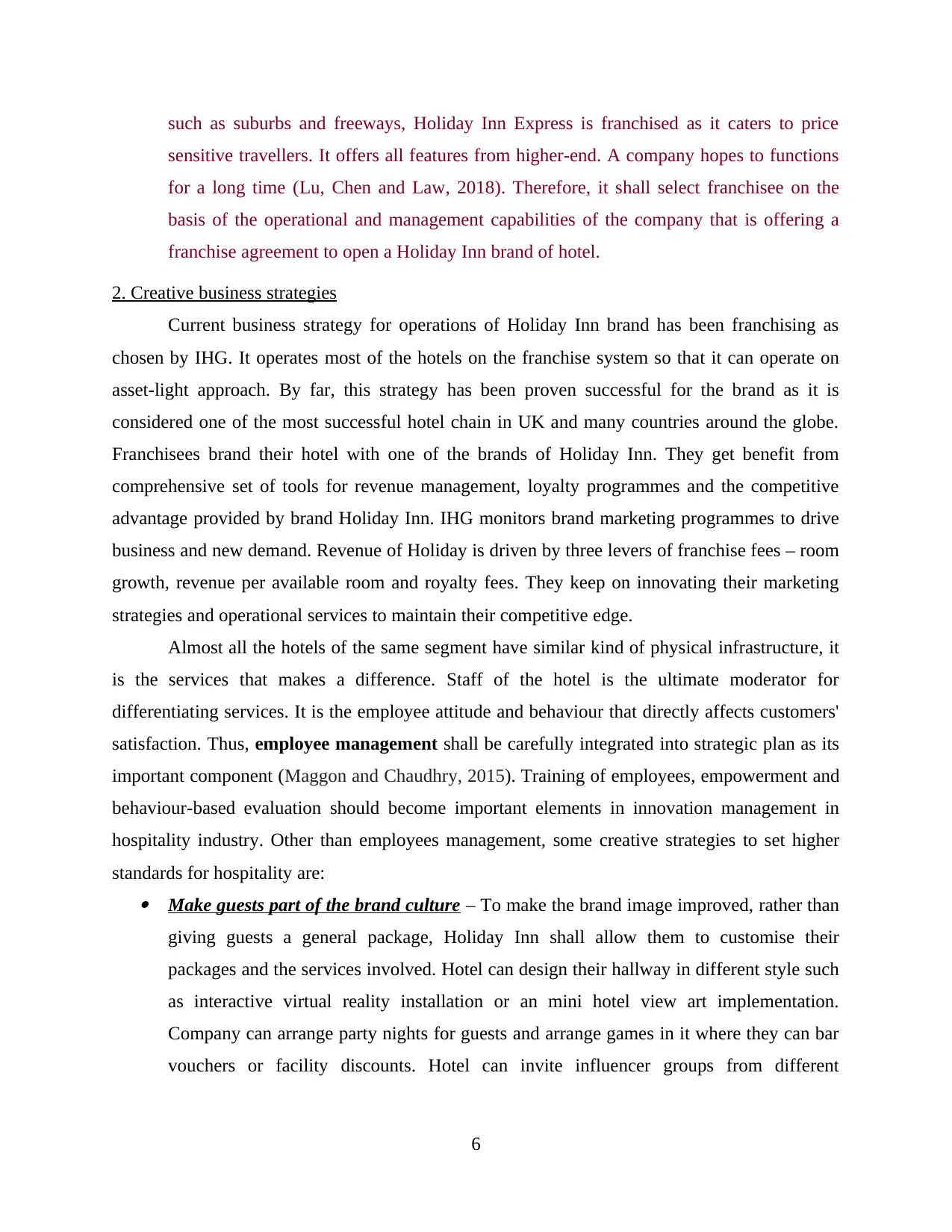
such as suburbs and freeways, Holiday Inn Express is franchised as it caters to price
sensitive travellers. It offers all features from higher-end. A company hopes to functions
for a long time (Lu, Chen and Law, 2018). Therefore, it shall select franchisee on the
basis of the operational and management capabilities of the company that is offering a
franchise agreement to open a Holiday Inn brand of hotel.
2. Creative business strategies
Current business strategy for operations of Holiday Inn brand has been franchising as
chosen by IHG. It operates most of the hotels on the franchise system so that it can operate on
asset-light approach. By far, this strategy has been proven successful for the brand as it is
considered one of the most successful hotel chain in UK and many countries around the globe.
Franchisees brand their hotel with one of the brands of Holiday Inn. They get benefit from
comprehensive set of tools for revenue management, loyalty programmes and the competitive
advantage provided by brand Holiday Inn. IHG monitors brand marketing programmes to drive
business and new demand. Revenue of Holiday is driven by three levers of franchise fees – room
growth, revenue per available room and royalty fees. They keep on innovating their marketing
strategies and operational services to maintain their competitive edge.
Almost all the hotels of the same segment have similar kind of physical infrastructure, it
is the services that makes a difference. Staff of the hotel is the ultimate moderator for
differentiating services. It is the employee attitude and behaviour that directly affects customers'
satisfaction. Thus, employee management shall be carefully integrated into strategic plan as its
important component (Maggon and Chaudhry, 2015). Training of employees, empowerment and
behaviour-based evaluation should become important elements in innovation management in
hospitality industry. Other than employees management, some creative strategies to set higher
standards for hospitality are: Make guests part of the brand culture – To make the brand image improved, rather than
giving guests a general package, Holiday Inn shall allow them to customise their
packages and the services involved. Hotel can design their hallway in different style such
as interactive virtual reality installation or an mini hotel view art implementation.
Company can arrange party nights for guests and arrange games in it where they can bar
vouchers or facility discounts. Hotel can invite influencer groups from different
6
sensitive travellers. It offers all features from higher-end. A company hopes to functions
for a long time (Lu, Chen and Law, 2018). Therefore, it shall select franchisee on the
basis of the operational and management capabilities of the company that is offering a
franchise agreement to open a Holiday Inn brand of hotel.
2. Creative business strategies
Current business strategy for operations of Holiday Inn brand has been franchising as
chosen by IHG. It operates most of the hotels on the franchise system so that it can operate on
asset-light approach. By far, this strategy has been proven successful for the brand as it is
considered one of the most successful hotel chain in UK and many countries around the globe.
Franchisees brand their hotel with one of the brands of Holiday Inn. They get benefit from
comprehensive set of tools for revenue management, loyalty programmes and the competitive
advantage provided by brand Holiday Inn. IHG monitors brand marketing programmes to drive
business and new demand. Revenue of Holiday is driven by three levers of franchise fees – room
growth, revenue per available room and royalty fees. They keep on innovating their marketing
strategies and operational services to maintain their competitive edge.
Almost all the hotels of the same segment have similar kind of physical infrastructure, it
is the services that makes a difference. Staff of the hotel is the ultimate moderator for
differentiating services. It is the employee attitude and behaviour that directly affects customers'
satisfaction. Thus, employee management shall be carefully integrated into strategic plan as its
important component (Maggon and Chaudhry, 2015). Training of employees, empowerment and
behaviour-based evaluation should become important elements in innovation management in
hospitality industry. Other than employees management, some creative strategies to set higher
standards for hospitality are: Make guests part of the brand culture – To make the brand image improved, rather than
giving guests a general package, Holiday Inn shall allow them to customise their
packages and the services involved. Hotel can design their hallway in different style such
as interactive virtual reality installation or an mini hotel view art implementation.
Company can arrange party nights for guests and arrange games in it where they can bar
vouchers or facility discounts. Hotel can invite influencer groups from different
6
⊘ This is a preview!⊘
Do you want full access?
Subscribe today to unlock all pages.

Trusted by 1+ million students worldwide
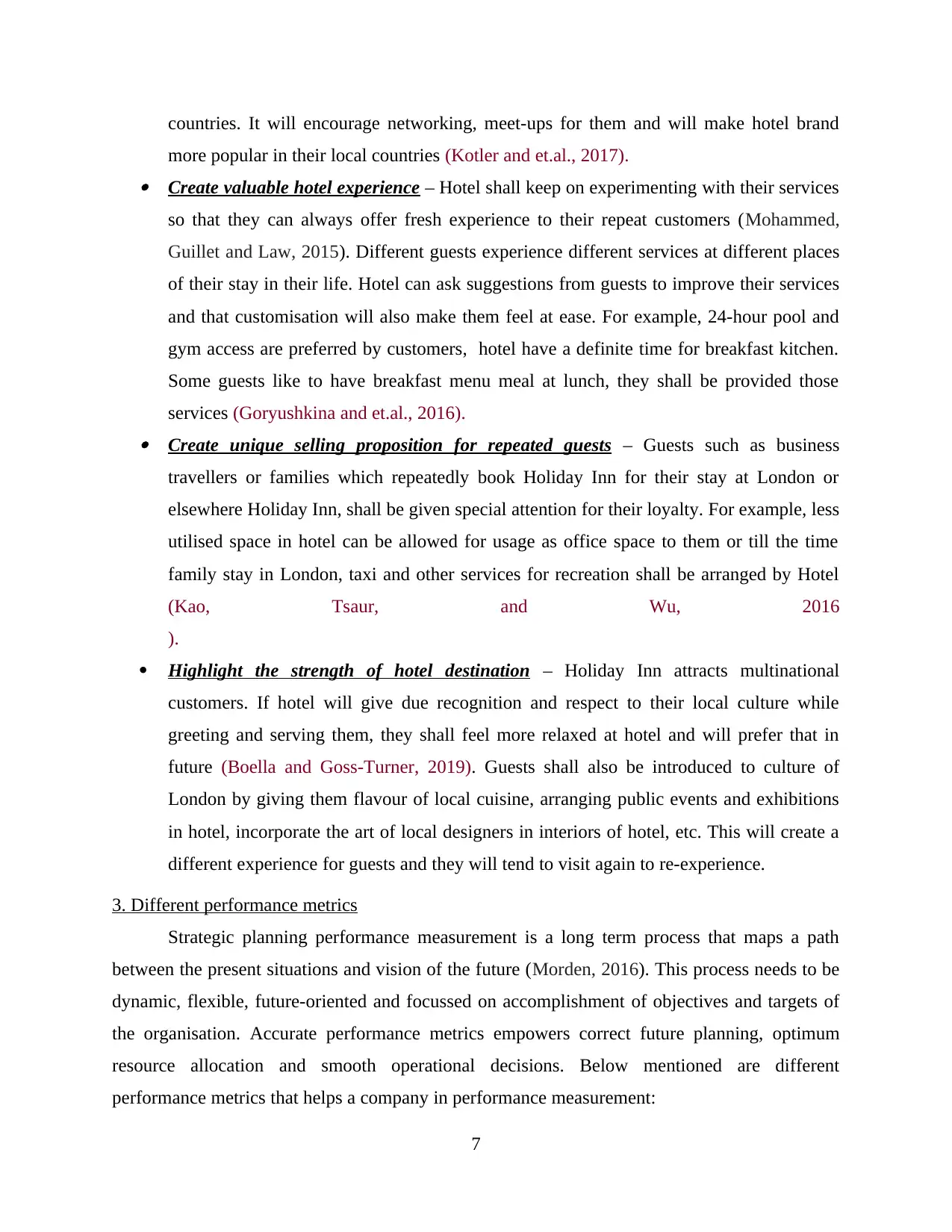
countries. It will encourage networking, meet-ups for them and will make hotel brand
more popular in their local countries (Kotler and et.al., 2017). Create valuable hotel experience – Hotel shall keep on experimenting with their services
so that they can always offer fresh experience to their repeat customers (Mohammed,
Guillet and Law, 2015). Different guests experience different services at different places
of their stay in their life. Hotel can ask suggestions from guests to improve their services
and that customisation will also make them feel at ease. For example, 24-hour pool and
gym access are preferred by customers, hotel have a definite time for breakfast kitchen.
Some guests like to have breakfast menu meal at lunch, they shall be provided those
services (Goryushkina and et.al., 2016). Create unique selling proposition for repeated guests – Guests such as business
travellers or families which repeatedly book Holiday Inn for their stay at London or
elsewhere Holiday Inn, shall be given special attention for their loyalty. For example, less
utilised space in hotel can be allowed for usage as office space to them or till the time
family stay in London, taxi and other services for recreation shall be arranged by Hotel
(Kao, Tsaur, and Wu, 2016
).
Highlight the strength of hotel destination – Holiday Inn attracts multinational
customers. If hotel will give due recognition and respect to their local culture while
greeting and serving them, they shall feel more relaxed at hotel and will prefer that in
future (Boella and Goss-Turner, 2019). Guests shall also be introduced to culture of
London by giving them flavour of local cuisine, arranging public events and exhibitions
in hotel, incorporate the art of local designers in interiors of hotel, etc. This will create a
different experience for guests and they will tend to visit again to re-experience.
3. Different performance metrics
Strategic planning performance measurement is a long term process that maps a path
between the present situations and vision of the future (Morden, 2016). This process needs to be
dynamic, flexible, future-oriented and focussed on accomplishment of objectives and targets of
the organisation. Accurate performance metrics empowers correct future planning, optimum
resource allocation and smooth operational decisions. Below mentioned are different
performance metrics that helps a company in performance measurement:
7
more popular in their local countries (Kotler and et.al., 2017). Create valuable hotel experience – Hotel shall keep on experimenting with their services
so that they can always offer fresh experience to their repeat customers (Mohammed,
Guillet and Law, 2015). Different guests experience different services at different places
of their stay in their life. Hotel can ask suggestions from guests to improve their services
and that customisation will also make them feel at ease. For example, 24-hour pool and
gym access are preferred by customers, hotel have a definite time for breakfast kitchen.
Some guests like to have breakfast menu meal at lunch, they shall be provided those
services (Goryushkina and et.al., 2016). Create unique selling proposition for repeated guests – Guests such as business
travellers or families which repeatedly book Holiday Inn for their stay at London or
elsewhere Holiday Inn, shall be given special attention for their loyalty. For example, less
utilised space in hotel can be allowed for usage as office space to them or till the time
family stay in London, taxi and other services for recreation shall be arranged by Hotel
(Kao, Tsaur, and Wu, 2016
).
Highlight the strength of hotel destination – Holiday Inn attracts multinational
customers. If hotel will give due recognition and respect to their local culture while
greeting and serving them, they shall feel more relaxed at hotel and will prefer that in
future (Boella and Goss-Turner, 2019). Guests shall also be introduced to culture of
London by giving them flavour of local cuisine, arranging public events and exhibitions
in hotel, incorporate the art of local designers in interiors of hotel, etc. This will create a
different experience for guests and they will tend to visit again to re-experience.
3. Different performance metrics
Strategic planning performance measurement is a long term process that maps a path
between the present situations and vision of the future (Morden, 2016). This process needs to be
dynamic, flexible, future-oriented and focussed on accomplishment of objectives and targets of
the organisation. Accurate performance metrics empowers correct future planning, optimum
resource allocation and smooth operational decisions. Below mentioned are different
performance metrics that helps a company in performance measurement:
7
Paraphrase This Document
Need a fresh take? Get an instant paraphrase of this document with our AI Paraphraser
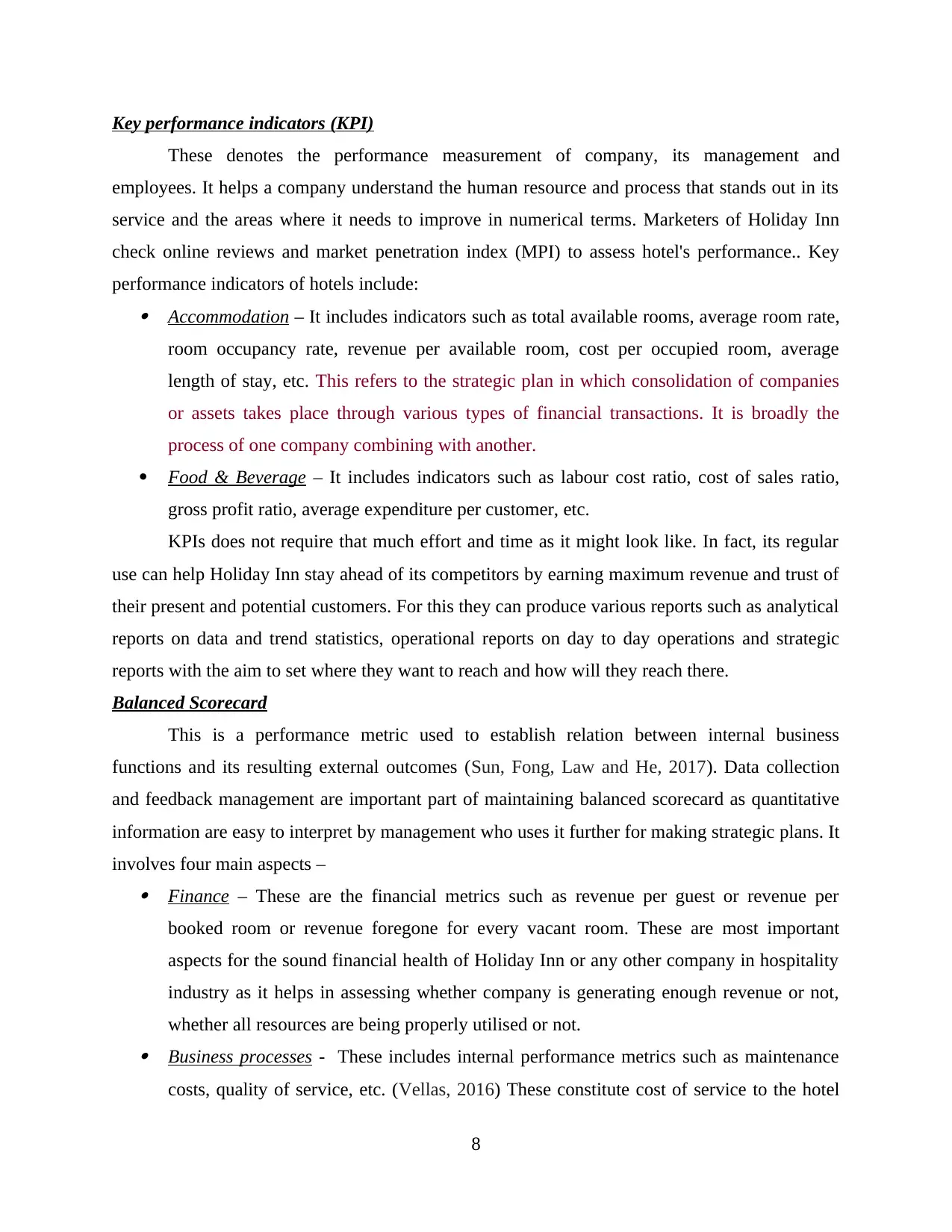
Key performance indicators (KPI)
These denotes the performance measurement of company, its management and
employees. It helps a company understand the human resource and process that stands out in its
service and the areas where it needs to improve in numerical terms. Marketers of Holiday Inn
check online reviews and market penetration index (MPI) to assess hotel's performance.. Key
performance indicators of hotels include: Accommodation – It includes indicators such as total available rooms, average room rate,
room occupancy rate, revenue per available room, cost per occupied room, average
length of stay, etc. This refers to the strategic plan in which consolidation of companies
or assets takes place through various types of financial transactions. It is broadly the
process of one company combining with another.
Food & Beverage – It includes indicators such as labour cost ratio, cost of sales ratio,
gross profit ratio, average expenditure per customer, etc.
KPIs does not require that much effort and time as it might look like. In fact, its regular
use can help Holiday Inn stay ahead of its competitors by earning maximum revenue and trust of
their present and potential customers. For this they can produce various reports such as analytical
reports on data and trend statistics, operational reports on day to day operations and strategic
reports with the aim to set where they want to reach and how will they reach there.
Balanced Scorecard
This is a performance metric used to establish relation between internal business
functions and its resulting external outcomes (Sun, Fong, Law and He, 2017). Data collection
and feedback management are important part of maintaining balanced scorecard as quantitative
information are easy to interpret by management who uses it further for making strategic plans. It
involves four main aspects – Finance – These are the financial metrics such as revenue per guest or revenue per
booked room or revenue foregone for every vacant room. These are most important
aspects for the sound financial health of Holiday Inn or any other company in hospitality
industry as it helps in assessing whether company is generating enough revenue or not,
whether all resources are being properly utilised or not. Business processes - These includes internal performance metrics such as maintenance
costs, quality of service, etc. (Vellas, 2016) These constitute cost of service to the hotel
8
These denotes the performance measurement of company, its management and
employees. It helps a company understand the human resource and process that stands out in its
service and the areas where it needs to improve in numerical terms. Marketers of Holiday Inn
check online reviews and market penetration index (MPI) to assess hotel's performance.. Key
performance indicators of hotels include: Accommodation – It includes indicators such as total available rooms, average room rate,
room occupancy rate, revenue per available room, cost per occupied room, average
length of stay, etc. This refers to the strategic plan in which consolidation of companies
or assets takes place through various types of financial transactions. It is broadly the
process of one company combining with another.
Food & Beverage – It includes indicators such as labour cost ratio, cost of sales ratio,
gross profit ratio, average expenditure per customer, etc.
KPIs does not require that much effort and time as it might look like. In fact, its regular
use can help Holiday Inn stay ahead of its competitors by earning maximum revenue and trust of
their present and potential customers. For this they can produce various reports such as analytical
reports on data and trend statistics, operational reports on day to day operations and strategic
reports with the aim to set where they want to reach and how will they reach there.
Balanced Scorecard
This is a performance metric used to establish relation between internal business
functions and its resulting external outcomes (Sun, Fong, Law and He, 2017). Data collection
and feedback management are important part of maintaining balanced scorecard as quantitative
information are easy to interpret by management who uses it further for making strategic plans. It
involves four main aspects – Finance – These are the financial metrics such as revenue per guest or revenue per
booked room or revenue foregone for every vacant room. These are most important
aspects for the sound financial health of Holiday Inn or any other company in hospitality
industry as it helps in assessing whether company is generating enough revenue or not,
whether all resources are being properly utilised or not. Business processes - These includes internal performance metrics such as maintenance
costs, quality of service, etc. (Vellas, 2016) These constitute cost of service to the hotel
8
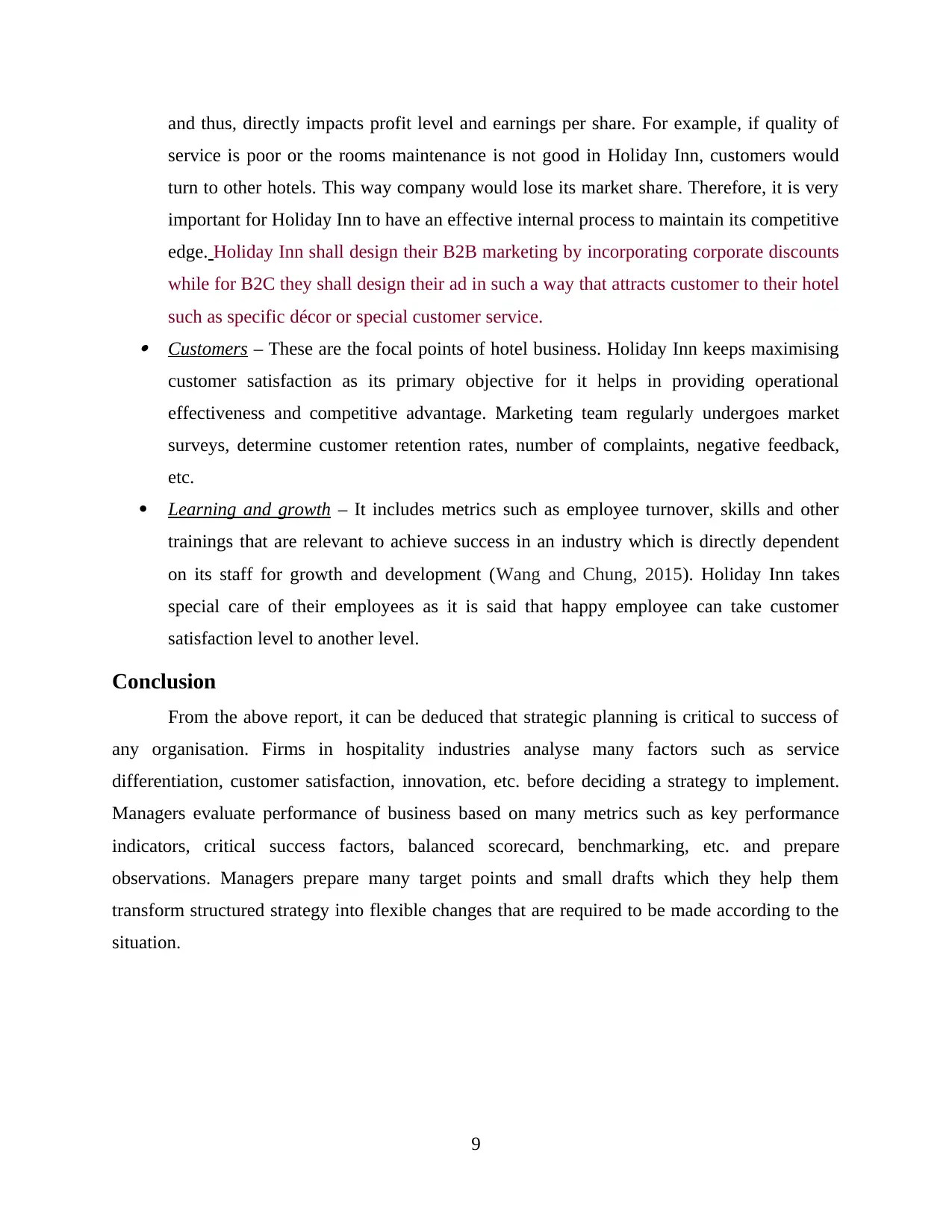
and thus, directly impacts profit level and earnings per share. For example, if quality of
service is poor or the rooms maintenance is not good in Holiday Inn, customers would
turn to other hotels. This way company would lose its market share. Therefore, it is very
important for Holiday Inn to have an effective internal process to maintain its competitive
edge. Holiday Inn shall design their B2B marketing by incorporating corporate discounts
while for B2C they shall design their ad in such a way that attracts customer to their hotel
such as specific décor or special customer service. Customers – These are the focal points of hotel business. Holiday Inn keeps maximising
customer satisfaction as its primary objective for it helps in providing operational
effectiveness and competitive advantage. Marketing team regularly undergoes market
surveys, determine customer retention rates, number of complaints, negative feedback,
etc.
Learning and growth – It includes metrics such as employee turnover, skills and other
trainings that are relevant to achieve success in an industry which is directly dependent
on its staff for growth and development (Wang and Chung, 2015). Holiday Inn takes
special care of their employees as it is said that happy employee can take customer
satisfaction level to another level.
Conclusion
From the above report, it can be deduced that strategic planning is critical to success of
any organisation. Firms in hospitality industries analyse many factors such as service
differentiation, customer satisfaction, innovation, etc. before deciding a strategy to implement.
Managers evaluate performance of business based on many metrics such as key performance
indicators, critical success factors, balanced scorecard, benchmarking, etc. and prepare
observations. Managers prepare many target points and small drafts which they help them
transform structured strategy into flexible changes that are required to be made according to the
situation.
9
service is poor or the rooms maintenance is not good in Holiday Inn, customers would
turn to other hotels. This way company would lose its market share. Therefore, it is very
important for Holiday Inn to have an effective internal process to maintain its competitive
edge. Holiday Inn shall design their B2B marketing by incorporating corporate discounts
while for B2C they shall design their ad in such a way that attracts customer to their hotel
such as specific décor or special customer service. Customers – These are the focal points of hotel business. Holiday Inn keeps maximising
customer satisfaction as its primary objective for it helps in providing operational
effectiveness and competitive advantage. Marketing team regularly undergoes market
surveys, determine customer retention rates, number of complaints, negative feedback,
etc.
Learning and growth – It includes metrics such as employee turnover, skills and other
trainings that are relevant to achieve success in an industry which is directly dependent
on its staff for growth and development (Wang and Chung, 2015). Holiday Inn takes
special care of their employees as it is said that happy employee can take customer
satisfaction level to another level.
Conclusion
From the above report, it can be deduced that strategic planning is critical to success of
any organisation. Firms in hospitality industries analyse many factors such as service
differentiation, customer satisfaction, innovation, etc. before deciding a strategy to implement.
Managers evaluate performance of business based on many metrics such as key performance
indicators, critical success factors, balanced scorecard, benchmarking, etc. and prepare
observations. Managers prepare many target points and small drafts which they help them
transform structured strategy into flexible changes that are required to be made according to the
situation.
9
⊘ This is a preview!⊘
Do you want full access?
Subscribe today to unlock all pages.

Trusted by 1+ million students worldwide
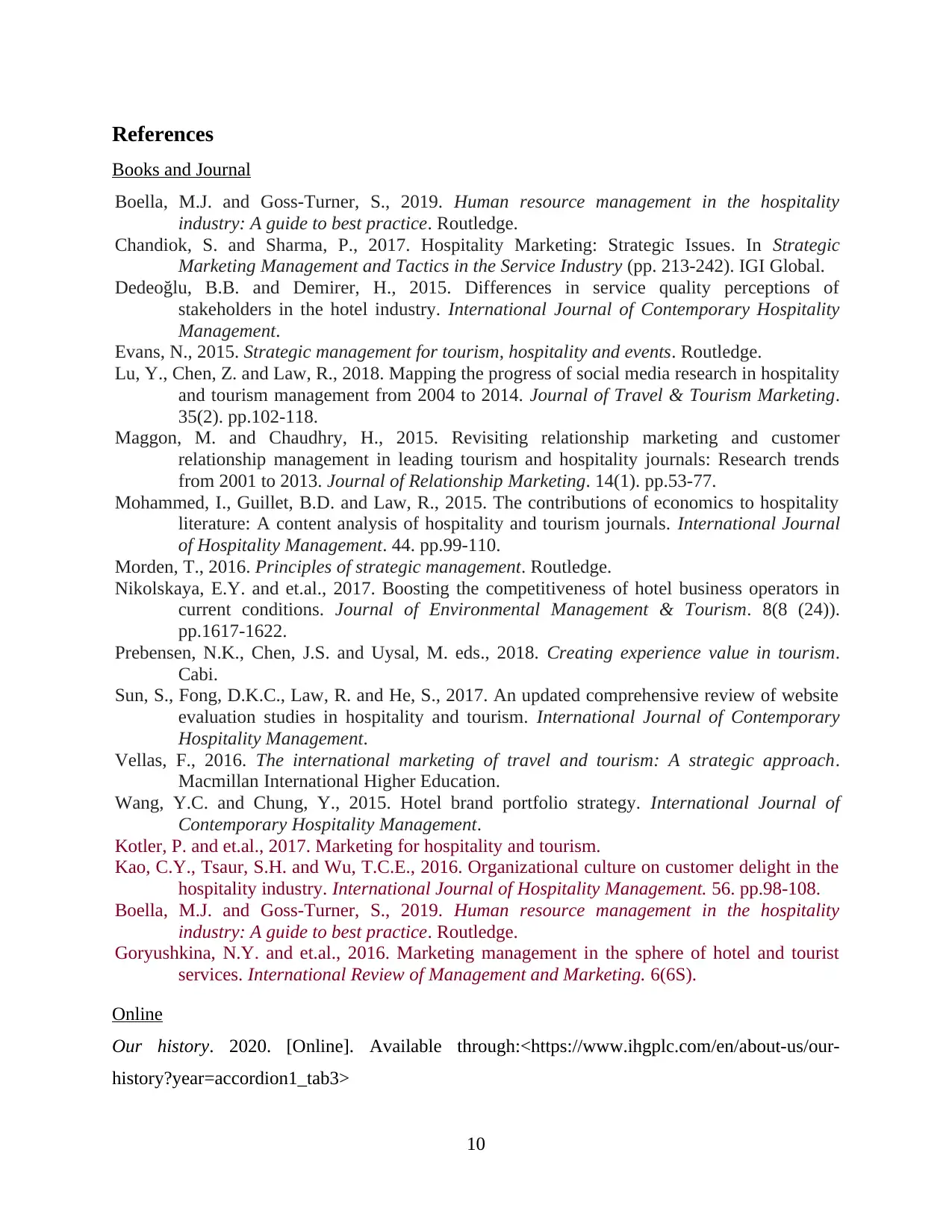
References
Books and Journal
Boella, M.J. and Goss-Turner, S., 2019. Human resource management in the hospitality
industry: A guide to best practice. Routledge.
Chandiok, S. and Sharma, P., 2017. Hospitality Marketing: Strategic Issues. In Strategic
Marketing Management and Tactics in the Service Industry (pp. 213-242). IGI Global.
Dedeoğlu, B.B. and Demirer, H., 2015. Differences in service quality perceptions of
stakeholders in the hotel industry. International Journal of Contemporary Hospitality
Management.
Evans, N., 2015. Strategic management for tourism, hospitality and events. Routledge.
Lu, Y., Chen, Z. and Law, R., 2018. Mapping the progress of social media research in hospitality
and tourism management from 2004 to 2014. Journal of Travel & Tourism Marketing.
35(2). pp.102-118.
Maggon, M. and Chaudhry, H., 2015. Revisiting relationship marketing and customer
relationship management in leading tourism and hospitality journals: Research trends
from 2001 to 2013. Journal of Relationship Marketing. 14(1). pp.53-77.
Mohammed, I., Guillet, B.D. and Law, R., 2015. The contributions of economics to hospitality
literature: A content analysis of hospitality and tourism journals. International Journal
of Hospitality Management. 44. pp.99-110.
Morden, T., 2016. Principles of strategic management. Routledge.
Nikolskaya, E.Y. and et.al., 2017. Boosting the competitiveness of hotel business operators in
current conditions. Journal of Environmental Management & Tourism. 8(8 (24)).
pp.1617-1622.
Prebensen, N.K., Chen, J.S. and Uysal, M. eds., 2018. Creating experience value in tourism.
Cabi.
Sun, S., Fong, D.K.C., Law, R. and He, S., 2017. An updated comprehensive review of website
evaluation studies in hospitality and tourism. International Journal of Contemporary
Hospitality Management.
Vellas, F., 2016. The international marketing of travel and tourism: A strategic approach.
Macmillan International Higher Education.
Wang, Y.C. and Chung, Y., 2015. Hotel brand portfolio strategy. International Journal of
Contemporary Hospitality Management.
Kotler, P. and et.al., 2017. Marketing for hospitality and tourism.
Kao, C.Y., Tsaur, S.H. and Wu, T.C.E., 2016. Organizational culture on customer delight in the
hospitality industry. International Journal of Hospitality Management. 56. pp.98-108.
Boella, M.J. and Goss-Turner, S., 2019. Human resource management in the hospitality
industry: A guide to best practice. Routledge.
Goryushkina, N.Y. and et.al., 2016. Marketing management in the sphere of hotel and tourist
services. International Review of Management and Marketing. 6(6S).
Online
Our history. 2020. [Online]. Available through:<https://www.ihgplc.com/en/about-us/our-
history?year=accordion1_tab3>
10
Books and Journal
Boella, M.J. and Goss-Turner, S., 2019. Human resource management in the hospitality
industry: A guide to best practice. Routledge.
Chandiok, S. and Sharma, P., 2017. Hospitality Marketing: Strategic Issues. In Strategic
Marketing Management and Tactics in the Service Industry (pp. 213-242). IGI Global.
Dedeoğlu, B.B. and Demirer, H., 2015. Differences in service quality perceptions of
stakeholders in the hotel industry. International Journal of Contemporary Hospitality
Management.
Evans, N., 2015. Strategic management for tourism, hospitality and events. Routledge.
Lu, Y., Chen, Z. and Law, R., 2018. Mapping the progress of social media research in hospitality
and tourism management from 2004 to 2014. Journal of Travel & Tourism Marketing.
35(2). pp.102-118.
Maggon, M. and Chaudhry, H., 2015. Revisiting relationship marketing and customer
relationship management in leading tourism and hospitality journals: Research trends
from 2001 to 2013. Journal of Relationship Marketing. 14(1). pp.53-77.
Mohammed, I., Guillet, B.D. and Law, R., 2015. The contributions of economics to hospitality
literature: A content analysis of hospitality and tourism journals. International Journal
of Hospitality Management. 44. pp.99-110.
Morden, T., 2016. Principles of strategic management. Routledge.
Nikolskaya, E.Y. and et.al., 2017. Boosting the competitiveness of hotel business operators in
current conditions. Journal of Environmental Management & Tourism. 8(8 (24)).
pp.1617-1622.
Prebensen, N.K., Chen, J.S. and Uysal, M. eds., 2018. Creating experience value in tourism.
Cabi.
Sun, S., Fong, D.K.C., Law, R. and He, S., 2017. An updated comprehensive review of website
evaluation studies in hospitality and tourism. International Journal of Contemporary
Hospitality Management.
Vellas, F., 2016. The international marketing of travel and tourism: A strategic approach.
Macmillan International Higher Education.
Wang, Y.C. and Chung, Y., 2015. Hotel brand portfolio strategy. International Journal of
Contemporary Hospitality Management.
Kotler, P. and et.al., 2017. Marketing for hospitality and tourism.
Kao, C.Y., Tsaur, S.H. and Wu, T.C.E., 2016. Organizational culture on customer delight in the
hospitality industry. International Journal of Hospitality Management. 56. pp.98-108.
Boella, M.J. and Goss-Turner, S., 2019. Human resource management in the hospitality
industry: A guide to best practice. Routledge.
Goryushkina, N.Y. and et.al., 2016. Marketing management in the sphere of hotel and tourist
services. International Review of Management and Marketing. 6(6S).
Online
Our history. 2020. [Online]. Available through:<https://www.ihgplc.com/en/about-us/our-
history?year=accordion1_tab3>
10
Paraphrase This Document
Need a fresh take? Get an instant paraphrase of this document with our AI Paraphraser

11
1 out of 11
Related Documents
Your All-in-One AI-Powered Toolkit for Academic Success.
+13062052269
info@desklib.com
Available 24*7 on WhatsApp / Email
![[object Object]](/_next/static/media/star-bottom.7253800d.svg)
Unlock your academic potential
Copyright © 2020–2026 A2Z Services. All Rights Reserved. Developed and managed by ZUCOL.





